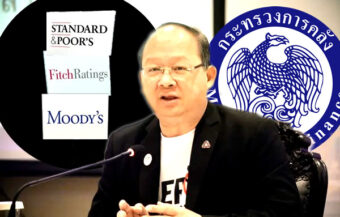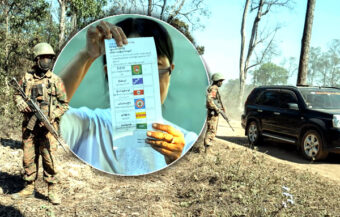Thailand’s tourism industry is collapsing as the surging baht, safety concerns, and rising competition from Vietnam and Malaysia are driving visitors away, threatening the kingdom’s vital economic engine while urgent government action is needed to stop the slide.
A top tourism insider is warning that Thailand’s tourism sector is in crisis and needs immediate government action. Since February, visitor numbers have been sliding, and the surge of the Thai baht is making matters worse. Safety and security concerns are piling up, deterring travellers further. Western long-haul markets, which have so far held steady, risk abandoning Thailand entirely as the baht strengthens toward year-end. Time is running out. Without bold, decisive action that produces real results, the rapid decline of Thailand’s economic lifeline will only accelerate.

Thailand’s economy is facing a serious year-end crisis, with foreign tourism showing sharp declines. According to official figures, international arrivals are down 7.1% compared to 2024. Consequently, Thailand has been overtaken by Malaysia as Southeast Asia’s top tourist hotspot. Moreover, Vietnam has become the preferred destination for Chinese travellers who once flocked to the Land of Smiles.
Arrivals to Thailand suddenly began to drop substantially in February, and the trend has not let up. Indeed, it may be getting stronger.
Tourism arrivals to Thailand fell sharply in February and the decline shows no signs of slowing this year
Rising concerns about safety and security are directly affecting Thailand’s tourism industry. At the same time, the baht’s appreciation has made the kingdom increasingly expensive for foreign visitors.
The combination of these factors has driven tourists to consider cheaper and more convenient alternatives in Southeast Asia. This is particularly evident among middle-class Chinese travellers, who are now choosing Vietnam over Thailand.
Mr. Adit Chairattananon, Secretary-General of the Association of Thai Travel Agents (ATTA), highlighted the urgency of restoring Thailand’s image abroad. He noted that the ongoing border dispute with Cambodia has created an atmosphere of uncertainty.
Consequently, many travellers are delaying or cancelling trips. “Restoring trust will take time,” Adit said, “but it is essential for tourism recovery.”
Furthermore, domestic tourism cannot be overlooked. The Minister of Tourism and Sports, according to Adit, must accelerate international communication campaigns. Likewise, the Minister of Finance should take urgent steps to address the strong baht. Both measures are necessary to strengthen confidence in Thailand as a tourist destination.
Strong baht and safety worries are driving visitors away while domestic tourism also needs urgent focus
The baht has been steadily strengthening throughout 2025. It is currently trading around ฿31.80 per US dollar, though analysts suggested it could weaken to 35. This appreciation reflects Thailand’s overall economic recovery.
However, the strong currency has reduced Thailand’s competitiveness for foreign visitors. Moreover, the baht is now more than 20% stronger against the Chinese yuan since the start of the year, making Thailand significantly more expensive for Chinese tourists than in previous years.
Consequently, travel to Thailand is increasingly less attractive. By contrast, Vietnam offers modern infrastructure and easy airport access to multiple cities.
Travelers can reach Hanoi, Ho Chi Minh City, Danang, Nha Trang, and Phu Quoc in under 30 minutes from the airport. Meanwhile, only Bangkok offers comparable convenience in Thailand. This difference has prompted middle-class tourists to explore alternatives.
Safety concerns remain another major challenge. Thailand’s international image is affected by long-standing issues of crime and public security. According to Adit, this problem has persisted for decades and will require sustained government action to resolve. “We cannot rely solely on Thailand’s historic appeal,” he said. “Safety and convenience now dominate travel decisions.”
Baht surge and safety worries prompt tourists to choose Vietnam over Thailand for convenience and value
ATTA forecasts that Chinese arrivals to Thailand in 2025 will remain subdued. Safety concerns, coupled with Beijing’s promotion of domestic tourism, continue to limit inbound travel.
Despite this, the organisation remains cautiously optimistic about long-term prospects. China’s middle class, currently numbering more than 400 million, is projected to double to 800 million by 2035. As this demographic grows, so will demand for overseas travel.
Chinese tourists currently take an average of five overseas trips per year. By comparison, Hongkongers average 13 trips, Singaporeans 14, Taiwanese nine, and Thais just 3.5. This gap highlights both the current shortfall in Thailand’s market share and the potential for growth. Thailand remains well-positioned as a short-haul destination within five hours of most major Chinese cities.
Nevertheless, rising costs in Thailand continue to pose challenges. The kingdom now has the highest living costs in ASEAN. The 20% appreciation of the baht against the yuan has made Thailand significantly more expensive for Chinese visitors compared to last year.
Vietnam’s infrastructure upgrades and affordability are tempting tourists away as Thailand faces turmoil
In addition, Vietnamese cities are building fresh tourist infrastructure, which is both modern and accessible. These improvements make Vietnam increasingly appealing for travellers who prioritise convenience and value.
The Thai government faces mounting pressure to act swiftly. Industry leaders are calling for urgent measures to restore safety confidence and cost competitiveness. Without decisive intervention, the tourism decline could worsen broader economic instability. “Immediate action is critical,” Adit said. “Otherwise, Thailand risks losing its regional position permanently.”
Furthermore, Thailand faces a paradoxical economic situation. Its currency is strong, yet poverty levels are rising, and liquidity is limited. The kingdom’s external finances, though robust, may not suffice to prevent a potential credit downgrade if economic imbalances persist. Experts warn that failure to address these issues could have cascading effects throughout the broader economy.
Tourism accounts for a significant portion of Thailand’s GDP — indeed, up to 20% if employment and indirect effects are measured. Therefore, the sector’s decline directly threatens overall economic growth.
Rising costs and a strong baht are creating a perfect storm that threatens Thailand’s tourism recovery
Rising living costs, the strong baht, and safety concerns combine to create a perfect storm that could stifle recovery. If international confidence is not restored, Thailand risks long-term damage to its reputation as a leading destination in Southeast Asia.
Immediate action must focus on restoring safety perception, improving infrastructure, and managing currency strength. High-level engagement, such as official overseas visits, can help rebuild confidence internationally.
Thailand still retains significant advantages in the regional tourism market. Its proximity to major Chinese cities, cultural heritage, and short-haul travel appeal remain strong draws. Analysts estimate that, with the right policies, Thailand could attract 15–20 million Chinese visitors annually. Such numbers would surpass previous highs, despite current setbacks.
Rising regional competition is forcing Thailand to respond or risk losing its tourism market permanently
Nevertheless, rising competition from neighbouring countries is intensifying. Vietnam, Malaysia, and other Southeast Asian destinations now offer cost-effective alternatives with modern infrastructure.
Tourists can travel easily, safely, and affordably. Consequently, Thailand can no longer rely solely on its traditional reputation for beaches, culture, and cuisine. It must respond decisively to retain and grow its market share.
Industry representatives stress that communication and transparency are crucial. Clear messaging on safety, costs, and convenience is needed to counter negative perceptions. Additionally, investment in tourism infrastructure is critical to match competitors.
Only then can Thailand maintain its appeal to middle-class travellers, who prioritise both safety and value.
The baht’s strength and rising costs are reducing inbound tourism and threatening Thailand’s economic stability
The impact of the baht’s strength cannot be overstated. Analysts warn that continued appreciation may further reduce inbound tourism.
For Chinese travellers, the current 20% increase in costs compared to last year makes alternatives like Vietnam more attractive. Meanwhile, middle-class tourists from other countries also consider cost, convenience, and security when planning trips.
Looking ahead, the government must implement a coordinated strategy. Addressing safety concerns, stabilising the baht, and promoting tourism both domestically and internationally are urgently needed. Industry experts emphasise that time is short to prevent further losses in visitor numbers. Failure to act quickly could allow competitors to solidify their positions.
Real pressures from costs, liquidity and competition put Thai tourism and economy at high-stakes risk
However, immediate economic pressures cannot be ignored. Rising living costs, liquidity constraints, and regional competition are converging to create a high-stakes situation. Tourism, as a key economic driver, is particularly vulnerable. Without urgent government action, declines in visitor numbers could have significant ripple effects across multiple sectors.
Undoubtedly, Thailand’s economy is at a pivotal moment. Tourism, currency fluctuations, and safety concerns now combine to challenge traditional growth patterns.
Strong government intervention is essential to stabilise tourism, rebuild confidence and maintain regional competitiveness. Nothing less will do.
Long-term strategies focusing on affordability, infrastructure, and image are crucial for Thailand
As Thailand heads into its traditional high season, the fear is that the overpriced baht will hit long-haul western visitors. These high spenders have been resilient so far in 2025, with growth seen in key European markets.
Economists baffled by extraordinary and damaging rise of the baht in 2025 hitting tourism and exports
Outgoing Bank of Thailand boss warns of a possible credit downgrade. Tourism engine has not recovered
Top economist warns of a stronger baht as the US economy weakens. Tourism and exports face a severe hit
However, at the same time, the baht tends to strengthen at the end of the year. In these times of tightened budgets everywhere, the fear is that many may look elsewhere, particularly to Vietnam, which has been eating Thailand’s lunch.
After that, next year will be decisive for Thailand. How the government responds to these economic and image challenges will determine whether the kingdom retains its traditional appeal or permanently loses ground to regional competitors. With swift and effective measures, Thailand can still regain its position as a leading Southeast Asian destination. It will however, need to confront what presently appears to be an invisible force behind the baht.
Join the Thai News forum, follow Thai Examiner on Facebook here
Receive all our stories as they come out on Telegram here
Follow Thai Examiner here
Further reading:
Rate cut anticipated as outgoing Bank of Thailand governor attends last Monetary Policy Committee
Last minute tweaks in Bangkok as deal is finalised with U.S. However, Thailand may not match Vietnam


















